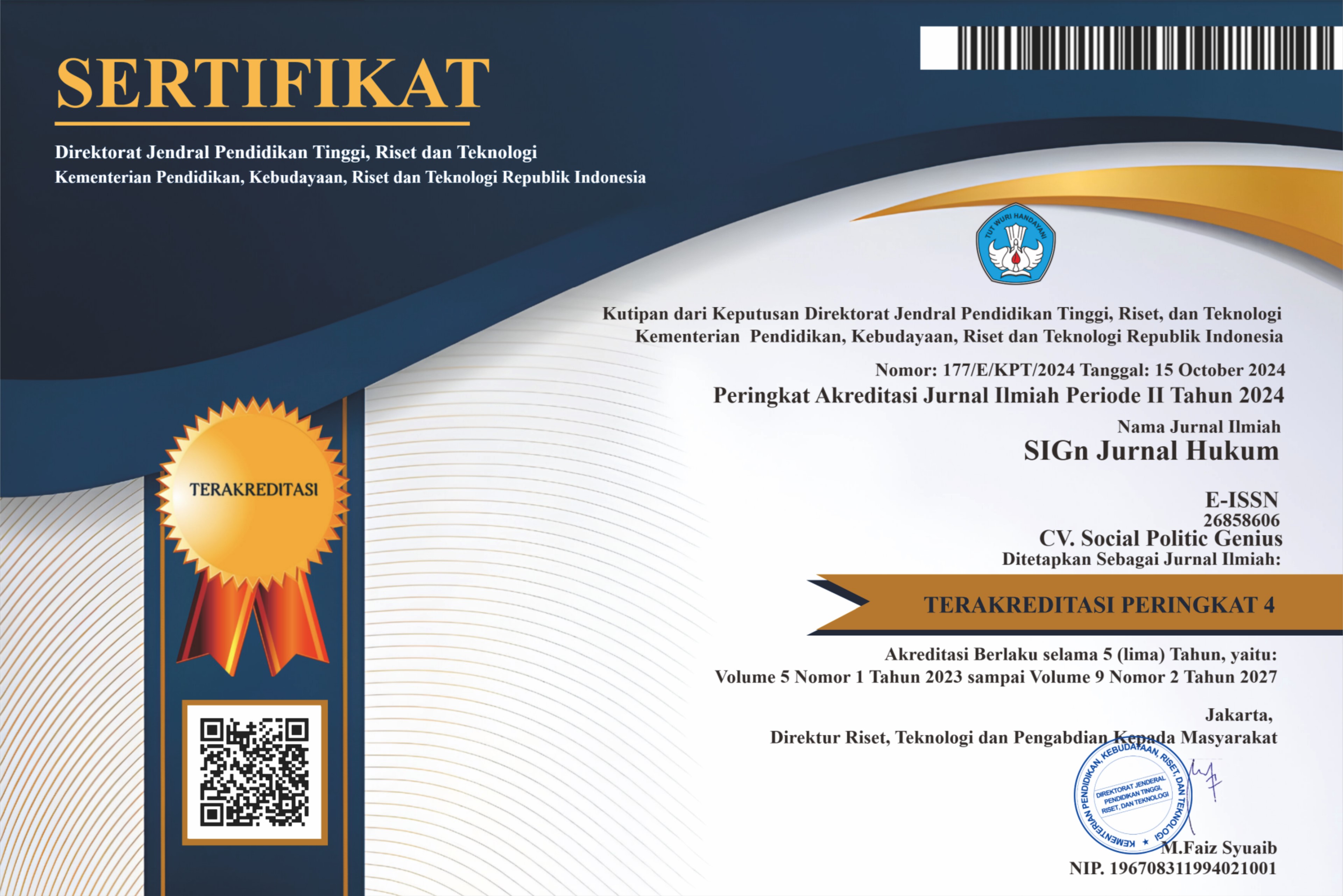Legal Consequences of Violating the Endogamy Marriage System in Indonesia: A Study of Legislation
Abstract
This study aims to examine and analyze how sanctions are applied for violating the endogamous marriage system and linked in the context of the positive law system in Indonesia. This study uses normative legal research with conceptual, historical, and comparative approaches. The collected legal material is then qualitatively analyzed to describe the problem and answer study purposes. The results show sanctions and consequences for individuals violating the endogamous marriage system. Sanctions can range from social ostracism, status demotion to fines and withdrawal of access to resources. In religious endogamy, violations are considered sins, and marriages can be declared invalid under Law Number 1 of 1974. Violations of racial or ethnic and caste endogamy do not have formal legal consequences but can impact an individual’s social status. Therefore, it is recommended that authorities and community leaders continue educating individuals about the implications of these endogamous marriage systems. The need for open dialogues about the pros and cons of these systems is also essential. Furthermore, the Indonesian legal system should protect all individuals’ rights and uphold principles of equality and non-discrimination while respecting cultural and religious nuances.
Downloads
References
The 1945 Constitution of the Republic of Indonesia. https://www.dpr.go.id/jdih/uu1945
Corinthians 6. (2023). The Bible. YouVersion. https://www.bible.com/bible/2863/2CO.6.PBTB2
Collet, B., & Santelli, E. (2016). Endogamy versus Homogamy. Marital Choice among Descendants of North African, Sahelian African and Turkish Immigrants in France. Journal of Family Research, 28(2), 245-264. https://doi.org/10.20377/jfr-58
Compilation of Islamic Law. (2011). Himpunan Peraturan Perundang-Undangan yang Berkaitan dengan Kompilasi Hukum Islam dengan Pengertian dalam Pembahasannya. The Supreme Court of the Republic of Indonesia. https://perpustakaan.mahkamahagung.go.id/assets/resource/ebook/23.pdf
Hidayati, R., & Ramlah, R. (2020). The Shifting View on the Prohibition of Exogamous Marriage among the Suku Anak Dalam Community. Al ‘Adalah, 17(2), 231-248. https://doi.org/10.24042/adalah.v17i2.5396
Law of the Republic of Indonesia Number 1 of 1974 on Marriage (State Gazette of the Republic of Indonesia of 1974 Number 1, Supplement to the State Gazette of the Republic of Indonesia Number 3019). https://www.dpr.go.id/jdih/index/id/742
Law of the Republic of Indonesia Number 16 of 2019 on Amendment to Law Number 1 of 1974 on Marriage (State Gazette of the Republic of Indonesia of 2019 Number 186, Supplement to the State Gazette of the Republic of Indonesia Number 6401). https://www.dpr.go.id/jdih/index/id/1753
Lévi-Strauss, C. (1960). On Manipulated Sociological Models. Bijdragen tot de Taal-, Land- en Volkenkunde, 116(1), 45-54. https://doi.org/10.1163/22134379-90002223
Lingaas, C. (2022). Indigenous Customary Law and Norwegian Domestic Law: Scenes of a (Complementary or Mutually Exclusive) Marriage? Laws, 11(2), 1-13. https://doi.org/10.3390/laws11020019
Lowie, R. H. (1911). A New Conception of Totemism. American Anthropologist, 13(2), 189-207. https://doi.org/10.1525/aa.1911.13.2.02a00010
Malinowski, B. (2002). The Sexual Life of Savages in North-Western Melanesia: An Ethnographic Account of Courtship, Marriage, and Family Life among the Natives of the Trobriand Islands, British New Guinea. Routledge.
Mangarengi, A. A., & Hamzah, Y. A. (2021). The Position of the Marriage Law on Interfaith Marriages Abroad. SIGn Jurnal Hukum, 3(1), 65-83. https://doi.org/10.37276/sjh.v3i1.127
Muzakkir, M. (2022). Integrasi Hukum Adat dalam Hukum Perkawinan di Indonesia (Analisis UU No. 1 Tahun 1974 dan KHI Indonesia). Jurnal Hukum Samudra Keadilan, 17(1), 61-69. https://doi.org/10.33059/jhsk.v17i1.5609
Ngamanken, S. (2013). Fenomena Keterlantaran Suku Baduy di Pulau Jawa. Humaniora, 4(2), 1064-1073. https://doi.org/10.21512/humaniora.v4i2.3547
Nosita, S., & Zuhdi, S. (2022). Determination of Adult Status in Positive Law in Indonesia After Enacted Law Number 16 of 2019. SIGn Jurnal Hukum, 4(1), 15-29. https://doi.org/10.37276/sjh.v4i1.132
Putriyah, N., & Wahib, A. B. (2015). Perkawinan Eksogami: Larangan Perkawinan Satu Datuak di Nagari Ampang Kuranji, Sumatera Barat. Al-Ahwal: Jurnal Hukum Keluarga Islam, 8(2), 175-188. https://doi.org/10.14421/ahwal.2015.08205
Q.S. Al-Baqarah. (2022). Qur’an Kemenag. Ministry of Religious Affairs of the Republic of Indonesia. https://quran.kemenag.go.id/quran/per-ayat/surah/2?from=1&to=286
Q.S. Ar-Rum. (2022). Qur’an Kemenag. Ministry of Religious Affairs of the Republic of Indonesia. https://quran.kemenag.go.id/quran/per-ayat/surah/30?from=1&to=60
Qamar, N., & Rezah, F. S. (2020). Metode Penelitian Hukum: Doktrinal dan Non-Doktrinal. CV. Social Politic Genius (SIGn).
Rahmaniah, S. E. (2014). Multikulturalisme dan Hegemoni Politik Pernikahan Endogami: Implikasi dalam Dakwah Islam. Walisongo: Jurnal Penelitian Sosial Keagamaan, 22(2), 433-456. https://doi.org/10.21580/ws.22.2.273
Rezah, F. S., & Muzakkir, A. K. (2021). Custom as a Critical Concept and Siri’ as the Core Concept of Ugi-Mangkasara Culture. SIGn Jurnal Hukum, 3(1), 40-51. https://doi.org/10.37276/sjh.v3i1.123
Rifqiyati, D. U. (2020). Dinamika Perkawinan Endogami pada Keturunan Arab di Yogyakarta. Khuluqiyya: Jurnal Kajian Hukum dan Studi Islam, 2(1), 25-44. https://doi.org/10.56593/khuluqiyya.v2i1.38
Sampara, S., & Husen, L. O. (2016). Metode Penelitian Hukum. Kretakupa Print.
Snježana, M., & Maja, B. (2018). Ethnic Intermarriage in Croatia with Special Emphasis on the Czech Minority. Geographica Pannonica, 22(1), 150-164. http://dx.doi.org/10.5937/22-16884
Sucipto, T., & Limbeng, J. (2007). Studi Tentang Religi Masyarakat Baduy di Desa Kanekes Provinsi Banten. Direktorat Kepercayaan terhadap Tuhan Yang Maha Esa Republik Indonesia.
Syukur, S. (2019). Endogamy Marriage Tradition of Sayyid Community in Sidenre Village, Binamu District, Jeneponto Regency. Jurnal Adabiyah, 19(1), 89-102. https://doi.org/10.24252/jad.v17i119i1a5
Tamam, B., & Ismawati, R. (2022). Tradisi Larangan Nikah Ngalor Ngulon di Daerah Purwoharjo Banyuwangi Perspektif Teori Sistem Jasser Auda. Mahakim: Journal of Islamic Family Law, 6(2), 101-125. https://doi.org/10.30762/mahakim.v6i2.167
Waluyo, H. (1997). Sistem Pemerintahan Tradisional di Tengger Jawa Timur. Departemen Pendidikan dan Kebudayaan Republik Indonesia.
Copyright (c) 2023 Agussalim A. Gadjong

This work is licensed under a Creative Commons Attribution 4.0 International License.

















